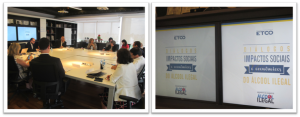Dialogues: Social and Economic Impacts of Illegal Alcohol opens discussion on beverage risk
Last month, ETCO held a discussion on causes, consequences and solutions for combating the production and trade of illegal alcoholic beverages. The table, called Dialogues: Social and Economic Impacts of Illegal Alcohol, brought in experts from various bodies, such as the Civil Police's Personnel and Citizenship Protection Department, the São Paulo Municipal Health Secretariat and the National Forum Against Piracy ( FNCP).
At the opening, ETCO's Executive President, Evandro Guimarães, highlighted the role of the Institute: “ETCO has its focus on combating 'corporate deviations': evasion, piracy, counterfeiting, adulteration, smuggling, embezzlement. This set of deviations needs a much less vision focused only on repression: we need to make an effort to understand why there is a culture of transgression rooted in society. ”
Among the various types of adulteration, piracy and illegality to be fought, illegal alcohol is on the agenda, since, in addition to harming companies regularly established through disobedience of technical, provenance and tax rules, it can also pose a health threat of those who consume it, in view of the presence of inappropriate substances. According to estimates by the World Health Organization (WHO), 25% of the alcohol consumed in the world comes from unregistered sources. In Brazil, according to Euromonitor research, this number rises to 28%.
Brazilian law already provides penalties for anyone who produces, exposes for sale or distributes illegal alcohol. There are two legal types that alcohol counterfeiters may incur, depending on the adulterated content. If it is harmful to human consumption, it is a crime against public health, as provided for in art. 272 of the Penal Code. If the original content is replaced by a lower quality liquid or diluted with water, a crime will still be committed: this time against consumer relations (art. 7 of Law 8.137 / 1990). In any case, not only the consumer is directly affected, but also the industry, which is at risk of having its products, developed after years of investments in quality research and brand promotion, replaced by very low quality and inappropriate content. consumption.
The multisectoral nature of the table served to reinforce the fact that, as in other types of illegal activities, action to combat illegal alcohol must be joint and synchronized, even to cover the existence of various types of unregistered drinks. in order to reduce the space for criminals to act. Another opportunity for action would be through information and communication to the population.
Evandro Guimarães pointed out, at the end of the event, that it is necessary to understand the size of this illegal market. “We need to expand this initiative beyond São Paulo. If it doesn't seem clear enough to the trader that selling adulterated drinks is a crime, we have to find a way to work on legislation, disclosure or both, ”he said. This was one of ETCO's many closing activities for the year, and the agenda will certainly find room for evolution in 2015.




